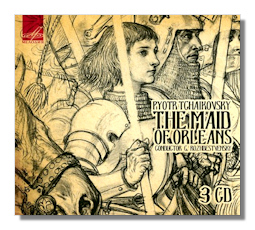
The Internet's Premier Classical Music Source
Related Links
- Tchaikovsky Reviews
- Latest Reviews
- More Reviews
-
By Composer
-
Collections
DVD & Blu-ray
Books
Concert Reviews
Articles/Interviews
Software
Audio
Search Amazon
Recommended Links
Site News
 CD Review
CD Review
Piotr Ilyitch Tchaikovsky

The Maid of Orleans
- Irina Arkhipova (Joan)
- Yevgeny Vladimirov (Thibaut)
- Vladimir Makhov (King Charles)
- Klavdia Radchenko (Agnes Sorel)
- Vladimir Valaitis (Dunois)
- Sergey Yakovenko (Lionel)
- Lev Vernigora (Archbishop)
- Andrey Sokolov (Raymond)
- Viktor Selivanov (Bertrand)
- Vartan Mikaelian (Soldier)
Academic Choir & Symphony Orchestra of All-Union Radio & Television, Scene & Wind Orchestra of the Bolshoi Theatre/Gennady Rozhdestvensky
Melodiya CD 1002053 ADD 3CDs: 53:26, 67:30, 52:51
In remarkable contrast to the preceding Eugene Onegin, Tchaikovsky's fifth surviving opera The Maid of Orleans (1878-81) emulates French grand opera, mixing grandiose pageantry with melodramatic passages against a pseudo-historic background – the intervention of Joan of Arc in the Anglo-French war in the early 15th century. Unlike its predecessor, The Maid of Orleans never achieved a firm place in the international opera repertory. Riddled with a flawed, patchwork libretto penned by the composer himself (largely based on Schiller's tragedy, but also the libretto by Jules Barbier and other sources) the opera may be overblown and dramatically uneven, yet it doesn't deserve its status of virtually complete neglect amongst Tchaikovsky's output either. There is plenty of splendid music to enjoy, in effect quite a lot more than in several other, more reputed operas – try the famous aria in Act 1, sometimes heard in concert programs, where Joan takes leave of the world she has known since childhood, but also her narration in Act 2, the two love duets with Lionel in Act 3 and 4, and the final scene.
Recordings of The Maid of Orleans are rare. There is the excellent historical Kirov Opera performance from 1946, conducted by Boris Khaikin and featuring a superb Sofia Preobrazhenskaya in the title role, and the now hard-to-find Bolshoi Opera performance under Alexander Lazarev on video from the early 1990s.
The present Melodiya CD reissue of the Moscow recording led by Gennady Rozhdestvensky from 1969 is certainly welcome, even if the cast is far from ideal. It's always exciting to hear the great Irina Arkhipova, brilliant and powerful, although it has to be said that her characterization of the heroic Maid remains somewhat clichéd. The baritone Sergey Yakovenko singing Lionel is easily the most interesting male voice of the cast and he turns the duets with Arkhipova into some of the high points of this recording. There is the good bass of Lev Vernigora as the Archbishop and the royal couple of Vladimir Makhov and Klavdia Radchenko is fair enough, yet the rest of the cast is merely serviceable rather than distinguished. (In this respect the older Kirov recording is preferable.) The choral work is generally fine though and Rozhdestvensky gives the score sufficient sweep, exalting the more pompous passages and offering plenty of bite in the orchestral passages. The extensive ballet sequence in Act 2 (a must for any opera in 19th-century French mold) is particularly enjoyable.
As usual in these Melodiya reissues there is no libretto and nothing has been done to improve the precarious sonics from 1969. Considering the rarity of the work, however, admirers of Tchaikovsky or Russian opera needn't hesitate.
Copyright © 2013, Marc Haegeman



















